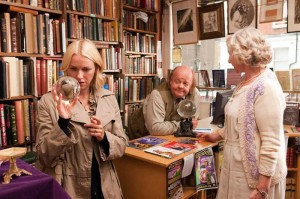
Crystal balls and Naomi Watts are among the many components of the ensemble comedy “You Will Meet a Tall Dark Stranger.”
If nothing else, “You Will Meet a Tall Dark Stranger” is one of Woody Allen’s most generously plotted movies.
Alfie (Anthony Hopkins) and Helena (Gemma Jones) are a 40-year-strong couple whose marriage dissolves when Alfie begins a senior-life crisis overnight and opts for a more youthful lifestyle, including a sudden engagement to a gold-digging former prostitute (Lucy Punch).
Meanwhile, their daughter Sally (Naomi Watts) is also seeing her marriage to a literary one-hit-wonder, Roy, (Josh Brolin) fall apart — not just because his new novel hasn’t been coming along for years, but also because he’s being distracted by a beautiful new neighbor whose window is always conveniently open for him (Freida Pinto), while she is feeling tempted by her suave, heart-on-sleeve new boss (Antonio Banderas).
And all of this is happening as Helena perpetually consults and reports on the advice of a fortune teller, Crystal (Pauline Collins). This gives Helena a sense of post-divorce comfort and meaning, even if everyone else considers homicide every time they have to hear yet another one of Crystal’s predictions related to them.
Phew — that plot description alone is longer than a lot of the movie reviews that get printed in Entertainment Weekly.
None of this is exactly new territory for Allen, who has made his third consecutive film centered around infidelity and has also returned to his new urban muse, London, after a brief New York City homecoming for “Whatever Works”.
What’s disappointing is that Allen is lazy about the convoluted affairs, or maybe just not really interested in their real comedic potential. He attends to the plot’s mechanics so dutifully that there’s barely any room for the narrative to breathe, or really take off.
He also, unfortunately, brings back the happy-go-lucky narrator from “Vicky Cristina Barcelona,” who must infuriate every middle school English teacher trying to drill “show, don’t tell” into their students’ minds.
However, “Tall Dark Stranger” has two very good things going for it. First, like many of Allen’s good-enough comedies, this film’s light pleasures outweigh its shortcomings. The story runs on sheer, immoral absurdity, so it’s always a joy to follow even if the acutual humor is spotty at best. The cast of mostly Allen first-timers takes very well to the story, especially Watts, who believably turns Sally from a patient struggler to a struggling brat, and Brolin, who gives the failed author sympathetic plight instead of shtick.
Second, like many of Allen’s underappreciated comedies, it helps to realize that there are larger implications to those simple pleasures. The “tall dark stranger” of the title is mentioned only in an off-the-cuff retort, and yet he courses through every twist and turn.
Whether it’s through trying to recapture youth, a madcap desire for literary immortality or a belated wake-up to switch lovers, these characters are all grappling with their own way of denying death. Allen mostly keeps his approach to this material lighthearted, the darkness imbedded in the events is hard to shake off afterward.
All of this makes the film’s ending a terrific way to tie the whole story together — the most hilarious complications finally set in, the deserving characters get a moral bitch slap and the most unlikely of sweet conclusions emerges from the former cynicism.
“You Will Meet a Tall Dark Stranger” begins with one of the most Woody Allen-esque Shakespeare quotes: “Life is a tale told by an idiot, full of sound and fury, signifying nothing.” But at the end of the film, it seems another one of the Bard’s great lines better sums up the overall experience: “All’s well that ends well.”
Grade: B
Silverstein is a member of the class of 2013.


